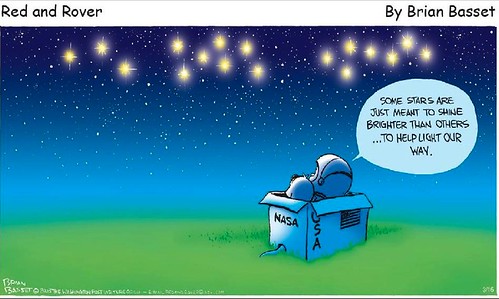Blueshift ponders… where were you?
- By Maggie Masetti
- February 1, 2011
- 3 Comments
This Red Rover cartoon was recently posted on NASA.gov in honor of the astronauts that have lots their lives in the pursuit of space exploration, and we wanted to share it with our readers too.
It’s a sad and thoughtful time of year for NASA, as we mark the anniversaries of three tragic accidents. The astronauts of Apollo 1 perished 44 years ago on January 27th, Challenger was lost 25 years ago on January 28th – and the tragic loss of Columbia occurred 8 years ago on this date. NASA held a Day of Remembrance last week to honor and mourn the sacrifices of these brave astronauts.
Blueshift Ponders: Some events define a generation. What are your memories of these events? Where were you? What are your hopes for the future of space exploration?
Maggie says: I wasn’t around for Apollo 1, but I remember Challenger very clearly. I was in 6th grade, and I was home sick from school. They interrupted the episode of Gilligan’s Island with the radioactive vegetables with the terrible news. (And I never found out what happened with the vegetables.) My mom was out at the supermarket and I had to tell her when she came home. She thought I was joking. The funny thing is that we were so complacent about the shuttle, like it was routine. I was even really into space, and there I was watching Gilligan’s Island instead of the shuttle. But it definitely had a profound impact on me.
For Columbia, my husband and one of our friends, and I were on our way out of town for the weekend and we heard the news on the radio when we stopped at a fast food place. We spent the whole weekend in sort of a sad daze. By this time I worked at NASA, and all three of us were really big space buffs. We’d all been in our college astronomy club. That these things happened is awful, but they serve as reminders that space flight is never routine. Still, I don’t think they should stop us from exploring space. Gus Grissom, one of the Apollo 1 astronauts said, “The conquest of space is worth the risk of life.” And I think he (and the other astronauts) believed it. Learning more about our planet, our solar system, our place in the Universe, is inherently risky, and it always has been. But I think the rewards can be really great.
Sara says: I was a bit younger than Maggie in 1986, so I don’t really have a vivid memory of the Challenger incident. My elementary school used to show the shuttle launches on a little television in our classroom, and I remember finding out that there had been an accident.
I found out about Columbia at the NASA credit union (yes, we have a bank) – I’d ridden the bus there on that Saturday, and all of the televisions in the lobby were tuned into the devastating news. Everyone was watching the story develop, paying more attention to the TV than to whatever they were there to do. I think it was especially somber because the bank was filled with NASA employees, and we all feel connected to the entire space program, regardless of what specific projects we work on.
Flight has never lost its magic for me – every time I get into an airplane, I still think that it’s pretty amazing that humans found a way to fly. Space exploration is even more astounding, and I try not to take it for granted and just see it as routine. The space program has been so successful, it definitely overshadows the loss. No endeavor is without risk, but I hope that we’ll keep pushing the boundaries and exploring the universe around us (whether those missions are manned or unmanned).
Now it’s your turn to share your thoughts, your memories, and your hopes in the comments below.
Comments are moderated and we ask that you be respectful. No profanity please! Any comments with non-NASA links may be edited or removed.
Disclaimer: All opinions in this blog entry are that of specific individuals and do not represent those of NASA, Goddard Space Flight Center, or Blueshift.




[…] This post was mentioned on Twitter by NASA Blueshift, Celestine Gulley. Celestine Gulley said: RT @NASAblueshift: Eight years after the loss of Columbia, we ponder the past and future of space exploration. Join us: http://bit.ly/euD3nX […]
I was in 9th grade in RI, and remember coming upstairs from lunch and one of the administrative staff who’s office some of us hung out in had his stereo on, which was unusual. I asked what happened, he told me that the Space Shuttle had exploded on launch. I didn’t believe him at first, but then after my English class started, the principal came on the PA and was audibly shaken. The rest of the day was kind of surreal.
Like Maggie, who I met at Space Camp, I don’t remember Apollo 1, but think that all astronauts understand the risks involved in space exploration. I am thankful that I live somewhere that these men and women were willing to risk their lives to further our understanding of space.
Hey Geoff, it’s awesome to see a comment from one of my SpaceCamp friends here! (Was that really 22 years ago?!) We were there only a few years after Challenger happened really, and it says something that our enthusiasm for the whole thing wasn’t dimmed by that tragedy. Thanks for your thoughts.